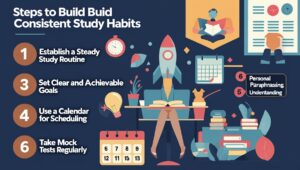How to Be Consistent in Studies – The Key to Academic Success
Developing consistent study habits is one of the most crucial skills for students aiming to excel academically. It’s not just about cracking competitive exams or earning top grades; it’s about long-term retention, effective learning, and building routines that positively influence other aspects of life. This blog post dives deep into proven strategies for establishing consistency in studies. Follow these tips to achieve your academic goals and live a more balanced and productive life.
Why Consistency is the Cornerstone of Success in Studies
Consistency in studies offers numerous benefits that go beyond academic performance. Here’s why it is essential:
- Enhances Retention
Regular study sessions improve memory retention, enabling you to recall concepts better over time.
- Reduces Stress
Consistent efforts eliminate the need for last-minute cramming, easing exam anxiety and making the learning process enjoyable.
- Improves Time Management
Following a daily study routine fosters effective study techniques, helping you allocate specific bits of study time for various subjects.
- Boosts Motivation
Establishing a habit reduces the reliance on bursts of motivation, making studying feel like a natural part of daily life.
- Leads to Better Outcomes
Consistent study habits often outweigh inherent talent, allowing even average students to unlock their potential doors to success.
Build Consistency, One Habit at a Time
Consistency is the cornerstone of success in studies, and it applies to every field of life. By attending classes, monitoring progress, and following effective study routines, you’ll unlock the doors to success in academics—and beyond.
Start small—choose one habit you’d like to build today, such as studying in the same favorite study location daily or celebrating tiny wins. Over time, these habits will add up, creating a consistent life filled with accomplishment.
For more insightful articles and practical tips, download the complete article series or subscribe to our blog for updates. A little effort today will make your future-you tasks seem easy tomorrow!
Attend Classes Consistently
Attending your classes regularly is the first step in building a foundation for your studies.
- Why It Matters:
- Regular attendance ensures you stay updated with the syllabus, preventing last-minute cramming.
- Listening to lectures and participating in discussions sharpens your understanding of the subject matter.
- Active involvement shows your commitment to academic success—a crucial skill for mature students and young learners alike.
- Pro Tip:
Carry a desk calendar or use a calendar app to note class schedules, assignment deadlines, and upcoming assessments. This practice helps you stay organized and ensures you dedicate enough time to each concerned topic.
Skipping classes might seem tempting during a busy life, but every missed session adds extra effort later. Build a consistent life by making class attendance a non-negotiable part of your daily routine.
Steps to Build Consistent Study Habits

1. Establish a Steady Study Routine
Creating a weekly study plan with specific time blocks for different tasks ensures a productive study plan. Here’s how to get started:
- Study at the Right Time
Are you a morning person or do you prefer finishing your favorite study book at night? Choose a time that aligns with your natural energy levels.
- Shorter Study Periods
Use focused study sessions of 25–50 minutes, followed by short study breaks. This prevents burnout and improves retention.
- Stick to Regular Times
Treat studying like any other daily task by setting a fixed time each day. Consistency trains your mind to focus during these slots.
- Plan Specific Tasks
Know exactly what you’ll study during your dedicated time. For example, decide if the time is for reviewing previous year question papers, practicing math problems, or reading 2-3 different books on a subject matter.
2. Set Clear and Achievable Goals
Setting realistic goals keeps your study efforts on track and ensures focus.
- Time-Based Goals
Commit to studying a set number of hours of effort or completing specific daily assignments.
- Content-Based Goals
Break down larger tasks like difficult assignments into smaller tasks, such as mastering one chapter or solving 10 exam-related questions.
- Track Your Progress
Use a tool like a desk calendar or a calendar app to cross off completed tasks. This builds confidence and accountability.
- Stay Flexible
Life happens! If you miss a goal, don’t be too hard on yourself. It’s part of a consistent and balanced approach.
3. Create a Designated Study Space
Your environment plays a significant role in ensuring focused study sessions. Set up a space that encourages productivity:
- Pick the Right Spot
Opt for study locations that are comfortable, well-lit, and free from noise.
- Organize Your Materials
Keep all essential study material—books, notes, and stationery—within reach to avoid interruptions.
- Remove Distractions
Turn off your phone or use apps to block social media during study time.
- Associate Space with Study
Having a regular study spot reinforces routine, signaling your brain that it’s time to focus.
4. Use a Calendar for Scheduling
A calendar app or a traditional planner can help you stay organized and consistent with your studies.
- Block Specific Hours
Dedicate certain hours for study and ensure no other activity clashes with these slots.
- Prioritize Tasks
Add your most challenging or time-sensitive tasks to the calendar first. This could include future-you tasks such as exam preparations.
- Maintain Realistic Schedules
Assign time slots relative to the complexity of each study task. For example, allocate shorter periods for reviewing mocks tests and longer ones for complex topics.
- Integrate Study Breaks
Schedule breaks during study sessions to refresh your mind and keep your cognitive performance at its peak.
5. Take Mock Tests Regularly
Mock tests are an excellent way to track your improvement and stay prepared:
- Identify Strengths and Weaknesses
Practice tests provide an accurate idea of areas where you’re excelling versus struggling.
- Recreate Exam Conditions
Mimic a real test environment to reduce exam anxiety and ensure you’re comfortable under pressure.
- Reinforce Retention
Regularly testing yourself strengthens long-term retention and improves attention span during study sessions.
6. Use Personal Paraphrasing for Understanding
Explaining concepts in your own words transforms rote learning into meaningful understanding.
- Improve Comprehension
Personal paraphrasing makes study material easier to grasp by relating it to your learning style.
- Long-Term Benefits
Engaging with content repeatedly in your own way fosters deep connections, aiding long-term retention.
- Collaborate With a Buddy
Try explaining ideas to a friend for clarification or setting up a fun activity like a friend quiz to challenge each other.
Monitor Your Academic Performance
Monitoring your progress ensures you’re moving in the right direction while providing insights into areas that need improvement.
- How to Monitor Progress:
- Track your results in mock tests to get a clear, accurate idea of your strengths and weaknesses.
- Use the feedback to adjust your study plan to focus on weaker sections.
- Discuss challenging areas with a teacher or a friend for clarification—peer support works wonders!
- Pro Tip:
Incorporate physical activity into your schedule. Consistent exercise refreshes your mind, improves focus, and enhances brain function, which directly impacts your cognitive performance and academic success.
By evaluating yourself regularly, you’ll strengthen attention regulation and reach your academic goals faster.
Actively Participate in Discussions
Classroom discussions aren’t just for extroverts—anyone can benefit from asking questions and engaging in debates.
- Benefits of Participation:
- Clarify doubts immediately, ensuring improved long-term retention.
- Strengthen your understanding by teaching others or participating in a friend quiz—an interactive fun activity that reinforces your learning.
- Stay updated with essential study habits shared by teachers or peers during discussions.
Remember, when you actively participate, you’re not just listening—you’re learning through interaction.
Limit Procrastination Through Prioritization
Procrastination is a major obstacle to maintaining consistent study habits. It’s easy to scroll through social media or get lost in distractions, but effective study routines thrive on prioritization.
Strategies to Avoid Procrastination:
- Recognize and Minimize Distractions:
- Turn off notifications and use browser extensions or apps to block distractions.
- Create a quiet and organized study environment with tools like noise-canceling headphones.
- Break Down Big Tasks:
- Divide tasks into smaller daily assignments that feel less overwhelming. For example, instead of reading an entire book at night, aim to complete one or two chapters.
- Use Motivational Techniques:
- Timed study sessions using the Pomodoro Technique (e.g., 50 minutes of study followed by 10-minute breaks) can keep you productive without feeling burnt out.
By learning to prioritize, you’ll limit wasted time and build essential self-discipline.
Take Short, Regular Breaks to Stay Focused

Continuous study sessions can lead to mental fatigue. Integrating study breaks into your daily routine can refresh your mind and make study time more efficient.
How to Take Effective Study Breaks:
- Follow the 50-10 Rule:
- Study for 50 minutes, then take a 10-minute break to stretch, walk, or perform a light exercise habit.
- Engage in Relaxing Activities:
- Incorporate fun activities like journaling, meditating, or a quick scroll through your “spicy brain” playlist to recharge your mood.
With breaks during study sessions, you’ll improve attention span and enhance retention.
Celebrate Achievements to Stay Motivated
Never underestimate the motivational impact of acknowledging your progress—no matter how small.
- Reward yourself for accomplishing goals, like finishing hours of effort on a difficult assignment or achieving high scores in competitive exams.
- Use these celebrations to reinforce a growth mindset that views every study session as a step toward the big picture.
Examples for rewards:
- Treat yourself to a fun activity.
- Post about your achievement in a study group or with friend relationships on social media.
Consistency requires effort, but the rewards make it worth the dedication.
Maintaining Consistency in a Busy Life
Balancing studies with other responsibilities can be challenging, but it’s achievable with effective study techniques.
- Stay Active
Incorporate daily exercise goals into your routine. Physical activity boosts brain function and helps maintain focus.
- Monitor Your Progress
Keep tweaking your study plan based on what’s working and what isn’t.
- Get Enough Rest
Aim for at least 7-8 hours of sleep. A fresh mind is key to productive sessions.
- Celebrate Small Wins
Finishing a difficult assignment or learning a concerned topic is worth a pat on the back. Reward yourself with a fun activity or break.
Develop Discipline Through Daily Habits
Effective study habits are built one day at a time. Discipline is the bedrock of a productive study plan, and it starts with small, manageable changes to your everyday life.
Steps to Build Discipline:
- Set a Regular Study Schedule:
- Dedicate consistent time slots in your day for focused study sessions. Whether it’s early morning or late at night from your favorite study location, consistency is key.
- Example: Block an hour each evening following dinner for study breaks followed by additional study sessions.
- Set Realistic Goals:
- Break down larger academic goals into daily tasks. For example, aim to review 2-3 different books by the end of the week or solve previous year question papers every weekend.
- Track Your Progress:
- Use tools like a planner or calendar app to keep track of accomplishments. Celebrating small wins like completing an assignment or mastering a difficult topic can sustain your motivation.
Remember, effective study techniques rely heavily on developing habits that don’t feel exhausting. Soon, studying will feel like a natural part of your day.
Seek Support from Peers and Mentors
Seeking support is a crucial skill that can make your study sessions more effective. Discussing study-related questions with a friend helps clarify doubts, while forming study groups enhances shared learning.
- Connect with instructors for valuable feedback on exam-related questions.
- Collaborate with a study buddy for additional study sessions or to explore new learning strategies.
The presence of a solid support system ensures a consistent and steady approach to studies.
Your Path to Consistent Success
Building consistent study habits is the bedrock of achieving your academic goals and opening doors to success in other areas of life. It’s not about doing everything perfectly but doing something intentionally every day.
Remember, even small bursts of motivation can get you started. What matters most is sticking to your idea of persistence. Over time, the effort you invest will lead to improved retention, reduced stress, and better performance.
Get your calendar app ready, design a productive study plan, and commit to taking practice tests regularly. Consistency may not be flashy, but it will always be the key to success.
Good luck, future achiever. You got this!
